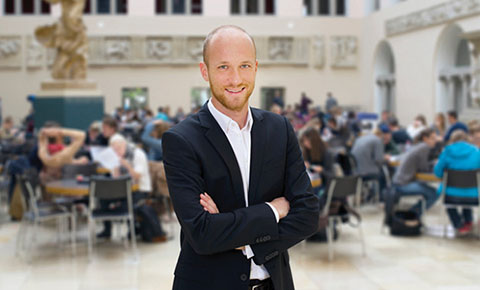What Happens When You Start Work During a Recession?

Recent graduates who are unlucky enough to join the workforce during a recession will likely see a loss in income and negative health effects over their lifetime, Northwestern University economist Hannes Schwandt told political analyst Amy Walter, host of The Takeaway, Fridays.
Schwandt, assistant professor at the School of Education and Social Policy, was one of several guests on Walter’s politics podcast which explored the impact the economic downturn caused by COVID-19 will have on a generation that was just starting to find their footing.
His working paper, frequently cited during the pandemic, suggests that timing is everything. Though the precise mechanism isn’t known, graduating during a recession has a cascading effect that leads to earnings and wage reductions over the long term, according to the working paper by Schwandt and coauthor Till von Wachter, professor of economics at the University of California, Los Angeles.
“This could mean less income, more stress, poor health behaviors, and maybe a riskier lifestyle,” said Schwandt, a fellow at Northwestern’s Institute for Policy Research. “We do see that mortality increases due to heart disease, drug overdose, lung cancer, liver disease – all causes that can be tied to health behaviors.”
The Coronavirus Aid, Relief, and Economic Security (CARES) Act, a more than $2 trillion economic relief package, is a good first step in protecting Americans from the public health and economic impacts of COVID-19, Schwandt said.
But it focuses on providing money in the short term, rather than the real issue, which is the lack of jobs, Schwandt said.
“Good candidates find good firms, create human capital, and become valuable employee over time,” he said. “During a recession, those matches don’t happen.”
A more direct and useful incentive would offer firms market wage subsidies to hire recent graduates and people new to the labor, Schwandt said.
Schwandt’s results don’t seal a person’s fate. You can always “make the best of it” and end up in an even better place in the long run, he said. In addition, simply knowing the downside of entering the workforce during a recession can help people see that their situation isn’t necessarily a personal failure. “That’s also true if things are still a bit more difficult a few years in when the rest of the economy has picked up again,” he said.
Finally, the data indicates that education in protective and buffers some of the shock. “Graduates who keep their eyes open for opportunities and switch employers when they see a better job in reach can catch up most quickly,” he said.
"I hope that our findings give those who will struggle hope and motivation to keep working on improving their situation and looking for opportunities along the way,” Schwandt added. "In the end, they might end up with jobs that better suit their skills and bring more fulfillment compared with ‘boom' graduates who are fine with the first job they land and get stuck on one pre-determined path.”
Read more coverage of Schwandt’s study, which was published by the National Bureau of Economic Research.
Politics with Amy Walter: How Coronavirus Will Hurt those Attempting to Enter the Workforce
NPR, 4/17
Special Report: How the COVID-19 lockdown will take its own toll on health
Reuters, 4/3
Republished by:
- New York Times, 4/3
Starting work in a recession affects people for their whole lives
The Economist, 2/ 4
Don’t root for a recession to knock out Trump
Washington Post, 1/6
Covid-19 Is Scrambling the Job Market for Recent Grads. Here’s How Colleges Are Trying to Respond.
The Chronicle of Higher Education, 4/10
Cancel This Semester. Adopt a Coronavirus Student Bill Instead.
Inside Higher Ed, 4/15
How the American economy can recover from the coronavirus pandemic
Fortune, 4/20
Entering the Job Market in Recession: The Prognosis Worsens
UCLA Anderson Review, 4/8
How the coronavirus’ economic toll could also affect public health
PBS Newshour, 3/ 30